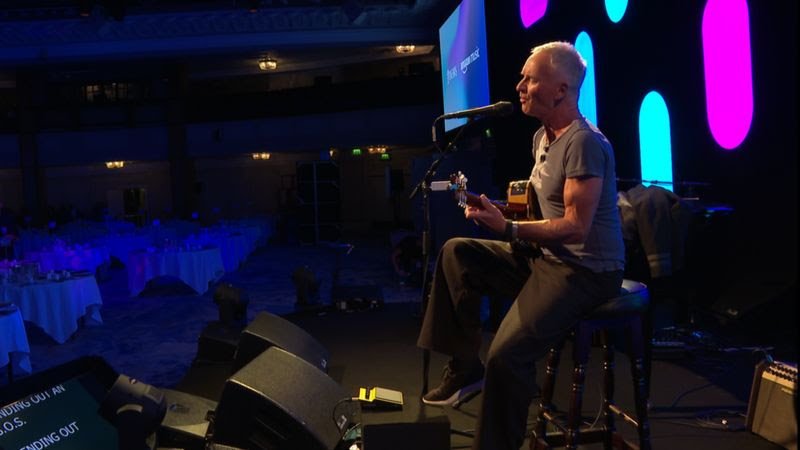
Sting claims that musicians are facing “a battle” to safeguard their work against the rise of songs written by artificial intelligence, glamsquad reports
READ ALSO: VIDEO: Pastor Biodun Fatoyinbo Shares His Testimony And How Pastor Oyedepo Healed Him
“The building blocks of music belong to us, to human beings,” he explained to the BBC.
“Defending our human capital against AI will be a battle we all have to fight in the coming years.”
His remarks came after a handful of tracks used artificial intelligence to “clone” the vocals of famous musicians.
DJ David Guetta utilized the technique in February to add Eminem’s “voice” to one of his tracks, while a bogus duet between Drake and The Weeknd went viral in April.
The latter was removed from streaming services following a copyright complaint by Universal songs Group (UMG), which also publishes Sting’s songs.

“It’s similar to how I watch a CGI movie.” “It doesn’t impress me in the least,” Sting stated.
“When I see a computer-generated image, I immediately become bored.” I expect to feel the same way about AI composing music.
“Perhaps it works for electronic dance music.” But I don’t think it will move me when it comes to songs that portray feelings.”
Sting spoke with the BBC for 30 minutes discussing a variety of topics, including his approach to songwriting.
The recording industry has immediately mobilized against AI, forming the “Human Artistry Campaign” and claiming that AI companies are infringing on copyright by training their software on commercially released music.
The legality of AI-created music is currently being debated. AI-generated creations, for example, can theoretically be protected under English copyright law.
The US Copyright Office, on the other hand, recently declared that AI art, including music, cannot be registered since it is “not the product of human authorship.”
Not everyone is opposed to technology. Neil Tennant of Pet Shop Boys recently stated that artificial intelligence (AI) could assist musicians overcome writer’s block.
“There’s a song that we wrote a chorus for in 2003 and never finished because I couldn’t think of anything for the verses,” he explained to the Radio Times.
“However, with AI, you can give it the bits you’ve written, press a button, and it will fill in the blanks.” You may then rewrite it, but it could still be useful.”
To a point, Sting agreed with Tennant’s observation.
“The tools are useful, but we have to be the ones driving them,” he remarked. “I don’t think we can just let the machines take over.” We must be cautious.”
Illustrious career
The musician was speaking ahead of the UK’s famous Ivor Novello songwriting awards, which will be presented to him on Thursday.
Only 23 persons have been named Ivor Academy Fellows, including British luminaries Paul McCartney, Kate Bush, Elton John, and Annie Lennox.
“Doesn’t it sound like something out of Lord of the Rings?” “A Fellowship,” laughed the star. “But winning a songwriting award means a lot to me because that’s what I put on my passport: I’m a songwriter.”
The Newcastle-born guitarist started his career as a member of The Police before going solo in 1984.
“I wanted to start again,” he explained of his choice to disband the band in the height of its glory. “When you’re in a band, you have to have a distinct sound. As a result, I was trapped as a songwriter.
“There was some risk involved,” he acknowledged, “but I wasn’t putting my life or anything at risk.” “I don’t believe you can be successful in music without taking risks.”
Over the course of his career, he has sold over 100 million albums and had global singles such as Message In A Bottle, Every Breath You Take, Fields Of Gold, Englishman In New York, and Shape Of My Heart.
However, he stated that his first appearance in the top 40, with The Police’s Roxanne, was a career highlight.
“I was painting the ceiling in my kitchen, on a plank atop a ladder, with Radio One on.” I suddenly recognized the tune and almost fell off the ladder.
“Nothing beats hearing yourself on the radio for the first time.” After then, it’s just a matter of diminishing returns.”
Last year, Sting sold his entire back catalog to UMG for a reported nine-figure fee, following in the footsteps of musicians like as Bruce Springsteen, Bob Dylan, Shakira, and Fleetwood Mac’s Stevie Nicks.
He claimed he gave up power because he trusted his record label and wanted to protect his musical legacy, especially after artists such as Prince and Jimi Hendrix were involved in messy postmortem estate issues.
“That could be a disaster.” So I believe it is preferable to take control of it immediately.”
The musician, though, acknowledged, “I still think of them as my songs.”
“Just as a painter who sells his paintings to collectors still considers the paintings to be his own, these are still my songs.”
“I was just compensated in advance. That’s all there is to it. That’s how I explain it.”
